Decoding Online Advertising Costs: An Expert Consultant's Guide
- Chase McGowan

- Oct 30, 2025
- 15 min read
Online advertising costs can swing wildly, from $0.10 a click on a platform like Pinterest to $50 or more for a single click in hyper-competitive industries on Google Ads. But the price you see on the platform isn’t the full story. The real budget killer is often the hidden management fees from bloated agencies that quietly eat up your entire investment before it has a chance to work for you.
Why Big Agency Fees Are Draining Your Ad Budget

When you hire a big ad agency, you’re not just paying for someone to manage your campaigns. You’re paying for layers of overhead that dilute your investment before a single dollar is even spent on ads. This structure is designed to protect their profits, not maximize yours.
Think about it like building a custom cabinet. You could hire a huge general contractor who sends a project manager to talk to a foreman, who then tells a crew what to do. Every single one of those layers adds a markup. Or, you could just hire the master carpenter directly. You pay for the specialized skill, not the administrative bloat. An expert Google Ads consultant is that master carpenter.
The Hidden Costs of Agency Overhead
Large agencies have massive operating costs, and guess who foots the bill? You do. These expenses are usually bundled into a vague "management fee," making it impossible to see where your money is actually going.
Here’s what you’re really paying for:
Multiple Account Managers: Your main point of contact is often just a go-between, passing messages to a junior specialist who’s actually running your campaigns. This game of telephone is a recipe for delays, miscommunication, and strategic errors.
Bloated Admin Staff: A slice of your fee goes to covering things that have zero impact on your results—from fancy office spaces to oversized sales teams and C-suite salaries.
Generic, Templated Strategies: Their teams are often overloaded, so they fall back on cookie-cutter strategies they apply to dozens of clients. Your business's unique needs get lost in the shuffle because they lack the time and specialized focus to do otherwise.
This model is built to protect the agency’s profit margins, not to maximize your campaign performance. As an independent consultant, I run a lean operation. My entire focus is on getting you results because my success is directly tied to yours.
By cutting out the unnecessary overhead, an expert consultant ensures more of your budget goes where it matters: driving leads and sales with meticulously managed campaigns.
Slow Responses and Wasted Spend
In the world of paid ads, speed is everything. When an opportunity pops up or a problem arises, you need action now. With a big agency, your "urgent" request can get stuck in a project management queue for days, buried under layers of internal bureaucracy.
That sluggish response time translates directly into missed opportunities and wasted ad spend. While you're waiting for a chain of internal approvals, your campaigns could be bleeding cash on the wrong keywords or audiences.
When you work with a dedicated expert like me, you get a direct line. We can make nimble adjustments in real-time to protect your budget and capitalize on what the data is telling us. That direct partnership is the key to cost-effective advertising that actually works.
Understanding Core Digital Advertising Pricing Models
If you want to get a grip on your online advertising costs, you first have to speak the language of ad pricing. Think of these core models as different ways to "pay for traffic" to your business. Choosing the right one is step one, but managing it effectively is where an expert's value really shines, stopping the kind of budget bleed that plagues so many agency-run campaigns.
Let's imagine you own a physical storefront. The three main pricing models would look something like this:
Cost-Per-Click (CPC): This is like paying a toll, but only when a car actually pulls into your parking lot. You pay the platform (like Google or Meta) every single time a potential customer clicks your ad. It’s a direct payment for a specific action—a visit.
Cost-Per-Mille (CPM): Think of this as the digital version of renting a highway billboard. You pay for every thousand people who see your ad (mille is Latin for thousand), whether they click on it or not. This model is all about getting your name out there and building brand awareness.
Cost-Per-Action (CPA): This is the ultimate "pay for performance" model, like hiring a salesperson who works purely on commission. You only pay when a specific, valuable action happens—a completed sale, a submitted contact form, or a phone call.
Choosing the Right Model for Your Goals
Each model is a tool for a different job. A generic agency might just default to a simple CPC model and try to rack up clicks, but a specialist digs deeper to figure out which model actually lines up with your business goals to make every dollar count. A solid grasp of what is cost per click and its alternatives is the foundation of smarter ad spending.
For example, a brand-new e-commerce store might lean on CPM to get its name in front of as many people as possible. On the other hand, a local plumber would probably focus on CPC or CPA to drive immediate leads and phone calls. It's all about matching the pricing model to the outcome you want. For anyone selling on Amazon, understanding the nuances of Amazon PPC costs is absolutely vital for allocating a budget that can actually compete.
To make this crystal clear, let's break down the big three pricing models in a simple table.
Online Advertising Pricing Models Explained
Here’s a quick comparison of the three primary pricing models, what they’re used for, and when you might choose one over the others.
Pricing Model | What You Pay For | Best For |
|---|---|---|
Cost-Per-Click (CPC) | Each click on your ad | Driving targeted traffic to a website or landing page. Ideal for lead generation and direct sales. |
Cost-Per-Mille (CPM) | Every 1,000 ad impressions (views) | Maximizing brand visibility and awareness. Perfect for top-of-funnel campaigns where reach is the main goal. |
Cost-Per-Action (CPA) | A specific conversion (e.g., sale, signup) | Performance-focused campaigns where you need to guarantee a return on every dollar spent. |
Ultimately, the right model depends entirely on what you're trying to achieve, from broad brand recognition to bottom-line sales.
An expert consultant doesn't just pick a pricing model and hit "go." I build an entire strategy around it. That means I'm constantly in the weeds—optimizing bids, tweaking ad creative, and refining targeting to drive down your CPC or CPA. It's a level of detail and specialization that often gets missed with a set-it-and-forget-it agency approach.
The digital ad space is only getting more crowded and more expensive. In fact, total digital ad spend is projected to jump by 7.9% in 2025, reaching a staggering $678.7 billion and accounting for 68.4% of all ad spending. As platforms rely more heavily on complex algorithms, having a strategic expert manage your spend isn't a luxury anymore—it's essential for survival. You can dig into more of these global ad spend forecasts on dentsu.com.
The Hidden Factors That Inflate Your Ad Spend
Ever wonder why your online ad costs keep creeping up, even when you haven't touched your budget? It's because your daily spend and keyword bids are only half the story.
Invisible forces are constantly working behind the scenes, either squeezing more value out of every dollar or quietly draining your bank account. Getting a handle on these factors is what separates a profitable campaign from a money pit.
The single most critical lever in platforms like Google Ads is your Quality Score. Think of it as your reputation at a private auction. If you walk in with a great reputation (a high Quality Score), the auctioneer gives you a better price on everything. But if your reputation is shot, you'll have to pay a premium just to get a seat at the table. A higher score directly translates to lower click costs and better ad positions.
This infographic breaks down the fundamental models where these costs are applied.
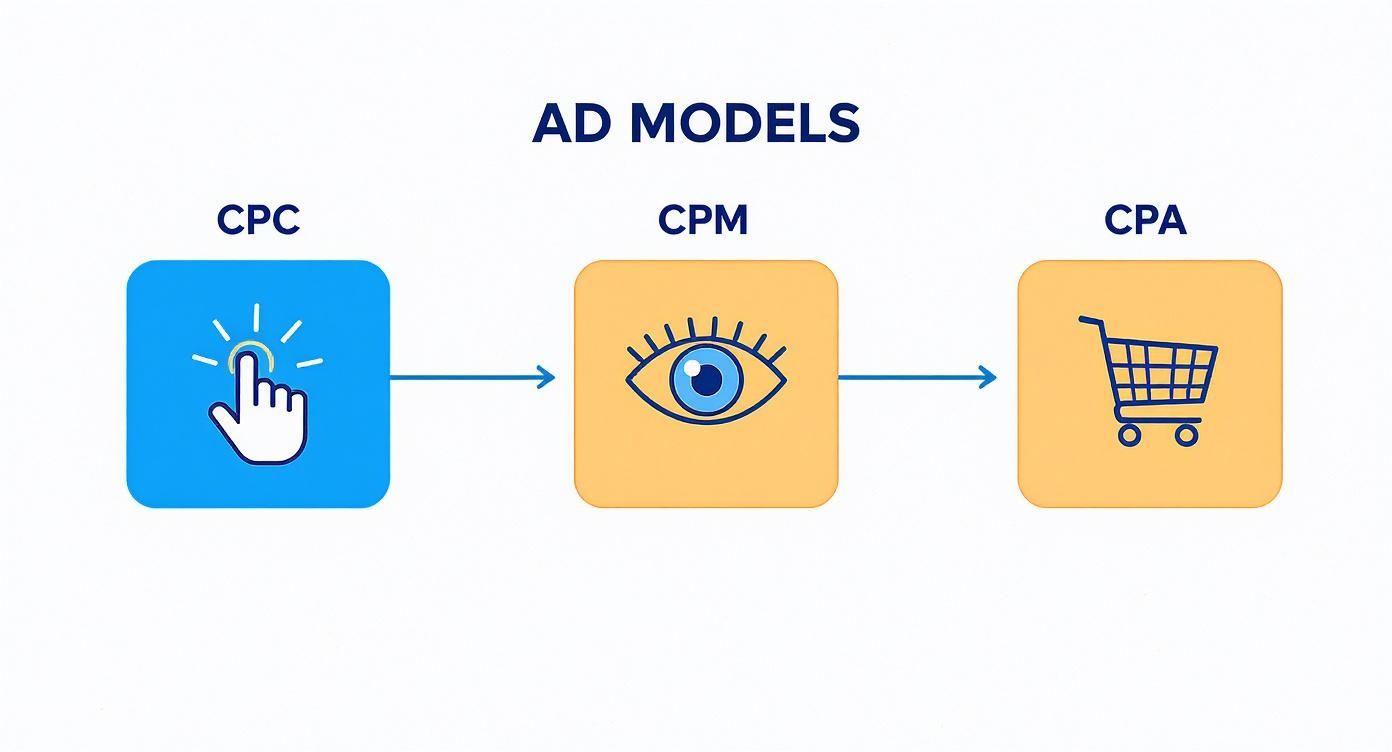
While this shows how you pay (per click, view, or action), your Quality Score is the lever that heavily influences how much you pay each time.
The Expert's Edge Over Bloated Agencies
So, how do you build that all-important "reputation"? It boils down to a few core components that a dedicated expert obsesses over—the same components that larger, overloaded agencies often ignore in favor of a much simpler solution: telling you to spend more money.
A true specialist dives deep into the technical details that build a high Quality Score:
Ad Relevance: This is about making sure your ad copy is a mirror image of the keywords people are searching for. It’s not about keyword stuffing; it’s about perfectly matching the user's intent.
Expected Click-Through Rate (CTR): You have to write ad copy that stops the scroll and actually earns the click. A high predicted CTR is a powerful signal to Google that your ad is a fantastic match for the query.
Landing Page Experience: The job isn't done after the click. You need a seamless, relevant, and user-friendly experience on the other side. A landing page that immediately answers the user's search query gets rewarded.
A high Quality Score is your single greatest tool for lowering ad costs. It's proof that you’re providing value to the user, and platforms like Google will reward you with cheaper clicks and premium ad placements for it.
This is where the difference between a hands-on expert and a big agency becomes crystal clear. An overloaded agency account manager, often juggling dozens of clients, simply doesn't have the bandwidth for this granular optimization. Their default move? Increase bids to compensate for a poor Quality Score, which directly inflates your online advertising costs.
In stark contrast, my primary mission as a specialist is to meticulously improve these core elements. By obsessively refining your ad relevance and landing page experience, I drive up your Quality Score. This disciplined approach systematically lowers your cost-per-click, stretches your budget further, and delivers a far better return on investment—all without just throwing more money at the problem.
The Real Cost of an Agency vs. an Expert Consultant
When you start digging into online advertising costs, the numbers you see on the ad platforms are just the tip of the iceberg. The real make-or-break factor often comes down to who you hire to manage that money.
Let’s get real about the difference between a typical agency and a specialist consultant, using a straight-up $10,000 monthly ad budget as our example.
Imagine you hand that $10,000 to a big, bloated agency. Right away, their fee structure is set up to benefit them, not you. They’ll likely skim 15-20% off the top as a management fee, which immediately pulls $1,500-$2,000 out of your ad budget. Think about that—their model actually incentivizes them to get you to spend more, not necessarily smarter.
Your money also gets spread thin across their massive overhead. A chunk of it pays for layers of account managers, project coordinators, and often a junior specialist who is the one actually running your campaigns. You’re footing the bill for their fancy office and sales team, not for dedicated expertise laser-focused on your ROI.
The Expert Consultant Value Proposition
Now, let's look at that same $10,000 budget in the hands of an expert consultant. My model is built on transparency and direct value—a completely different game.
Instead of a percentage-of-spend model that just encourages budget bloat, I work on a flat-rate retainer or a performance-based fee. This simple shift aligns my goals with yours. My fee is tied directly to the results I get for you, not how much of your money I can convince you to spend.
With a specialized consultant, you pay for dedicated, senior-level expertise. Every dollar of your management fee goes directly toward strategic thinking, hands-on optimization, and nimble adjustments—not funding a bloated corporate structure.
This direct access is huge. When you have a question or need to pivot fast, you talk directly to me—the expert managing your account. There’s no game of telephone, no waiting for someone to get back to you after an internal meeting. That kind of agility saves you a fortune by cutting wasted ad spend and jumping on opportunities the second they appear.
For a deeper dive into this dynamic, you can check out my breakdown of the benefits of hiring a senior Google Ads consultant over a bloated agency.
This isn’t just a small-scale trend. By 2025, global ad spend is projected to smash $1.17 trillion, with digital advertising gobbling up $798.7 billion of that total. As digital platforms claim nearly 73% of all ad budgets, the need for specialized, cost-effective management isn't just a nice-to-have; it's essential for survival. You can dig into more of these global advertising statistics and trends on Sender.net.
Cost Comparison Agency vs Expert Consultant ($10k/mo Ad Spend)
Let’s lay it all out so the difference is crystal clear. This table shows you exactly where your money goes with that $10,000 monthly ad spend when you choose between an agency and an expert.
Expense or Service | Typical Bloated Agency | Expert Individual Consultant |
|---|---|---|
Management Fee | $1,500 - $2,000 (15-20% of spend) | $1,000 - $1,500 (Flat-rate or value-based) |
Who Manages Account | Junior specialist overseen by a manager | A senior-level expert directly |
Strategy Approach | Often templated and applied to many clients | Custom-built for your specific business goals |
Response Time | Slow; must go through layers of staff | Immediate; direct line of communication |
Financial Incentive | Spend more to increase their fee | Drive results to retain you as a client |
When you see it side-by-side, the choice becomes pretty obvious. With an agency, a huge chunk of your investment is eaten by inefficiency and overhead. But with a consultant, your budget is protected and maximized by a true partner whose success is completely tied to your own.
Actionable Strategies to Lower Your Ad Costs Now
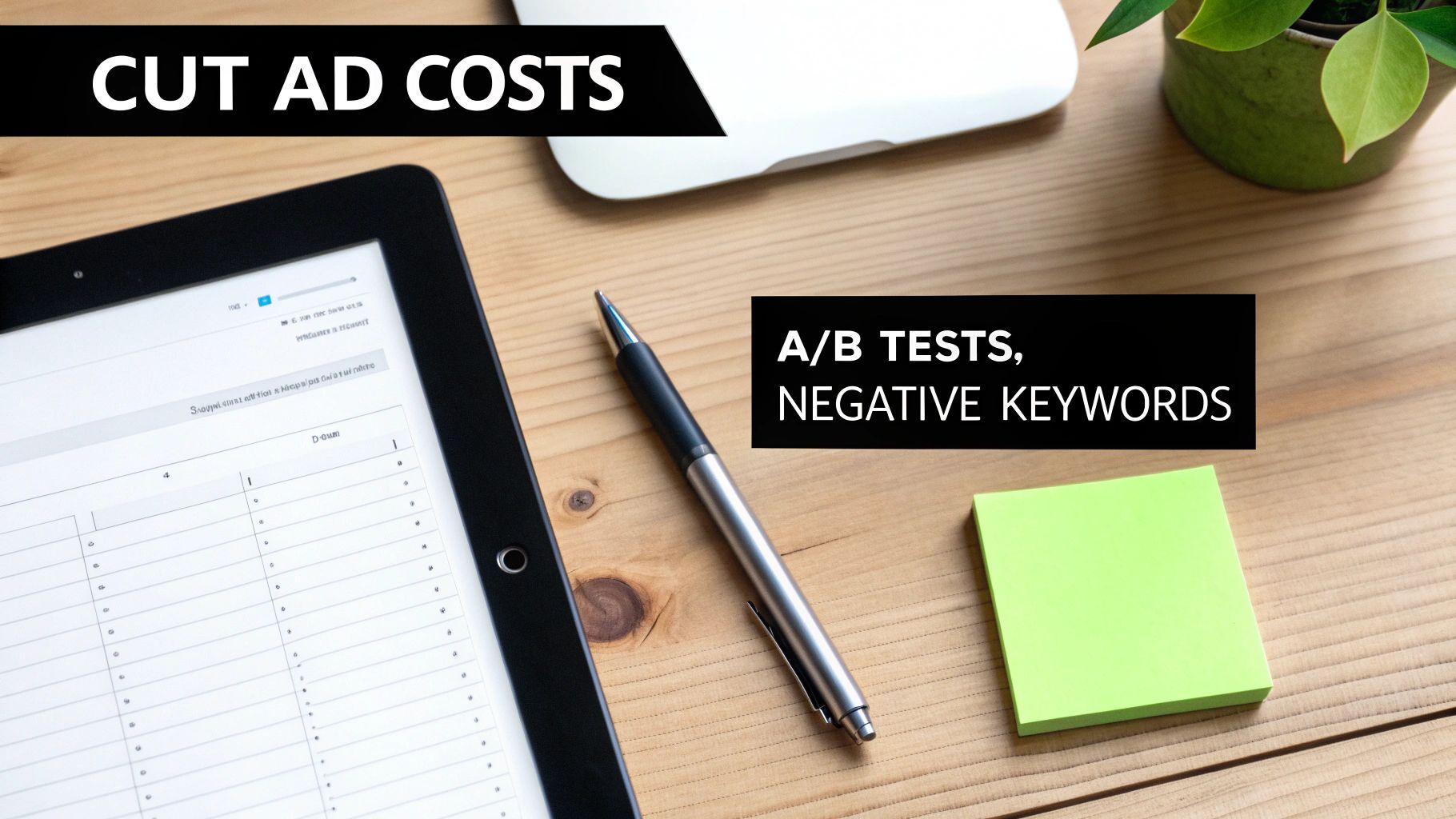
Knowing your numbers is one thing. Actually making them better is a whole different ball game.
A lot of big agencies see a problem and their first move is to throw more of your money at it. But a true expert rolls up their sleeves and gets surgical, finding ways to make every single dollar pull more weight. This is where my active, hands-on management pays for itself, over and over again.
These aren't "set it and forget it" tactics. They demand constant attention and a deep, practical understanding of how ad platforms really work—the kind of focus you get from a dedicated consultant, not a bloated agency juggling dozens of other clients.
Go Deep on High-Intent Long-Tail Keywords
Broad, one-word keywords like "shoes"? They’re a magnet for window shoppers and a bonfire for your budget. The real money is made in the margins.
As a specialist, I dig deeper, hunting for long-tail keywords. These are the longer, more specific phrases that signal someone is ready to buy, like “waterproof trail running shoes for wide feet.”
Sure, the search volume for each one is lower, but who cares? They are way cheaper to bid on and convert at a much higher clip. I build out massive lists of these gems, scooping up qualified leads your broader-focused competitors are totally blind to. It's tedious, specialized work, which is why most generalist agencies don't bother.
Build an Aggressive Negative Keyword Wall
Telling Google who to show your ads to is only half the battle. The other, equally critical half is telling it who not to.
A negative keyword strategy is your campaign's defensive line. It physically stops your ads from showing up for irrelevant searches that do nothing but drain your budget. Think of it as putting a "No Solicitors" sign on your digital storefront.
For instance, if you sell premium running shoes, you need to be adding negatives like “free,” “cheap,” and “used” from day one. This simple act prevents you from paying for clicks from people who were never going to buy from you in the first place.
I treat your search term reports like an intelligence briefing. I am constantly scanning for new threats—those budget-wasting keywords—and neutralizing them. This is an ongoing process of refinement that plugs the slow, steady leaks that plague neglected, agency-run accounts.
Run Disciplined A/B Tests—No Guesswork Allowed
Guessing is the most expensive thing you can do in advertising. The only way to find out what actually connects with your audience is to test everything, relentlessly.
A dedicated consultant runs disciplined A/B tests on every critical part of your funnel, from the ad headline all the way down to the color of the call-to-action button on your landing page.
This isn't about just throwing ideas at the wall. It’s a methodical process:
Form a Hypothesis: "I bet changing the headline from 'Shop Now' to 'Get 10% Off Your First Order' will boost our click-through rate."
Test One Variable at a Time: Run two identical ads where the only thing that's different is the headline. That way, you know for sure what caused the change in performance.
Analyze and Iterate: See which version won, make it the new control, and immediately start the next test.
This constant cycle of improvement is how you systematically lower your Cost Per Acquisition (CPA) over time. It’s a level of detail that requires singular focus—the kind of focus you can only get from an individual expert. For a deeper dive on this metric, our guide on how to lower your cost per acquisition breaks down even more advanced techniques.
Ultimately, this kind of active, expert-led optimization is the only reliable way to seize control of your ad costs and drive real, sustainable growth.
So, Who Should You Trust With Your Ad Spend?
Picking the right partner to run your ad campaigns is one of those make-or-break decisions. This isn’t just about getting a lower management fee; it’s about finding someone who is just as obsessed with your growth as you are. It's easy to get wowed by a slick agency sales pitch, but you need to know which questions to ask to cut through the noise and find a real expert.
The right partner can be the difference between a campaign that prints money and one that just burns through it. So, you need to go into those initial calls armed with questions that demand transparency and expose exactly who you’ll be working with day-to-day.
Questions That Expose the Agency Fluff
Here’s a classic agency move: they put their senior strategist on the sales call, get you to sign the contract, and then hand your account off to a junior specialist who’s still learning the ropes. Your first job is to sniff out this common bait-and-switch.
Get right to the point with these questions:
"Who, specifically, will be managing my account day-to-day?" Don’t let them off the hook with a vague answer. Get a name and a title. Then, dig deeper. Ask about their direct, hands-on experience with accounts your size and in your industry.
"What does your communication process actually look like?" Find out if you'll have a direct line to the person running your campaigns. If all your questions get filtered through an account manager who’s just a go-between, that’s a huge red flag. Quick, smart campaign changes require direct access.
"How do you measure and report on success?" If they start talking about "brand awareness" or "engagement," be skeptical. A real partner talks in business terms. They should be focused on your Cost Per Acquisition (CPA), Return on Ad Spend (ROAS), and the actual quality of the leads coming in.
Your goal is to find a partner who obsesses over strategic outcomes, not vanity metrics. A true expert consultant lives and breathes your campaign performance. A bloated agency is often more focused on keeping your contract than growing your bottom line.
This is where working directly with an expert consultant really shines. You’re not paying for fancy office space, layers of management, or the salary of a junior employee learning on your dime. You're paying for dedicated, senior-level expertise.
The right partner isn’t a vendor; they’re an extension of your team. They're proactive, spotting opportunities you might have missed and flagging issues before they turn into expensive mistakes. By asking these tough questions upfront, you can find someone who will treat every dollar of your ad spend like it’s their own.
Your Ad Cost Questions, Answered
Navigating the world of online advertising costs can feel like guesswork, but it doesn't have to be. Let’s cut through the noise and answer a few of the most common questions I hear from business owners. Getting these fundamentals right is the first step toward building a smart, profitable ad strategy.
How Much Should a Small Business Budget for Online Ads?
There's no magic number, but a smart starting point is what you can afford to test and learn with. Many experts suggest $500 to $1,000 per month to get your feet wet. This gives you just enough data to see what’s working without risking the entire marketing budget.
But here's the honest answer: it depends entirely on your goals. A real consultant doesn't just look at your ad spend; I obsess over your Return on Ad Spend (ROAS). I'll work backward from your revenue targets to figure out a budget that makes every dollar an investment in growth, not just another line item expense.
Is CPC Always Better Than CPM?
Not at all. Thinking one is always better than the other is a common mistake. It's like asking if a sniper rifle is better than a megaphone—it depends on the mission.
CPC (The Sniper Rifle): You pay only when someone shows genuine interest by clicking. This is your go-to for driving specific actions, like filling out a lead form or making a purchase. It's precise.
CPM (The Megaphone): You pay for sheer visibility and reach. It’s perfect for blanketing an area with your brand message, building awareness, and staying top-of-mind.
A seasoned pro knows exactly when to use each tool. A bloated agency might just stick with what's easy, but a specialist like me will build a blended strategy, using the right model for the right part of your sales funnel to squeeze every ounce of efficiency from your budget.
How Quickly Will I See a Return on My Ad Spend?
Patience is a virtue here, but you should start seeing positive signals within the first 30 to 90 days. This isn't just a waiting game; it's an intense period of data collection and optimization. As an expert, I use this time to ruthlessly cut wasteful keywords, refine targeting, and A/B test ad copy until it sings.
Big agencies with slow, clunky processes might take months to show any real progress. A nimble, hands-on consultant, on the other hand, can make critical adjustments in real-time. That direct approach means you start seeing meaningful results faster, turning that initial investment into a reliable engine for revenue.
Ready to stop overpaying bloated agencies and get real, expert management for your Google Ads? Come Together Media LLC offers the specialized, one-on-one consulting your business needs to maximize ROI. Book your free, no-obligation consultation today!




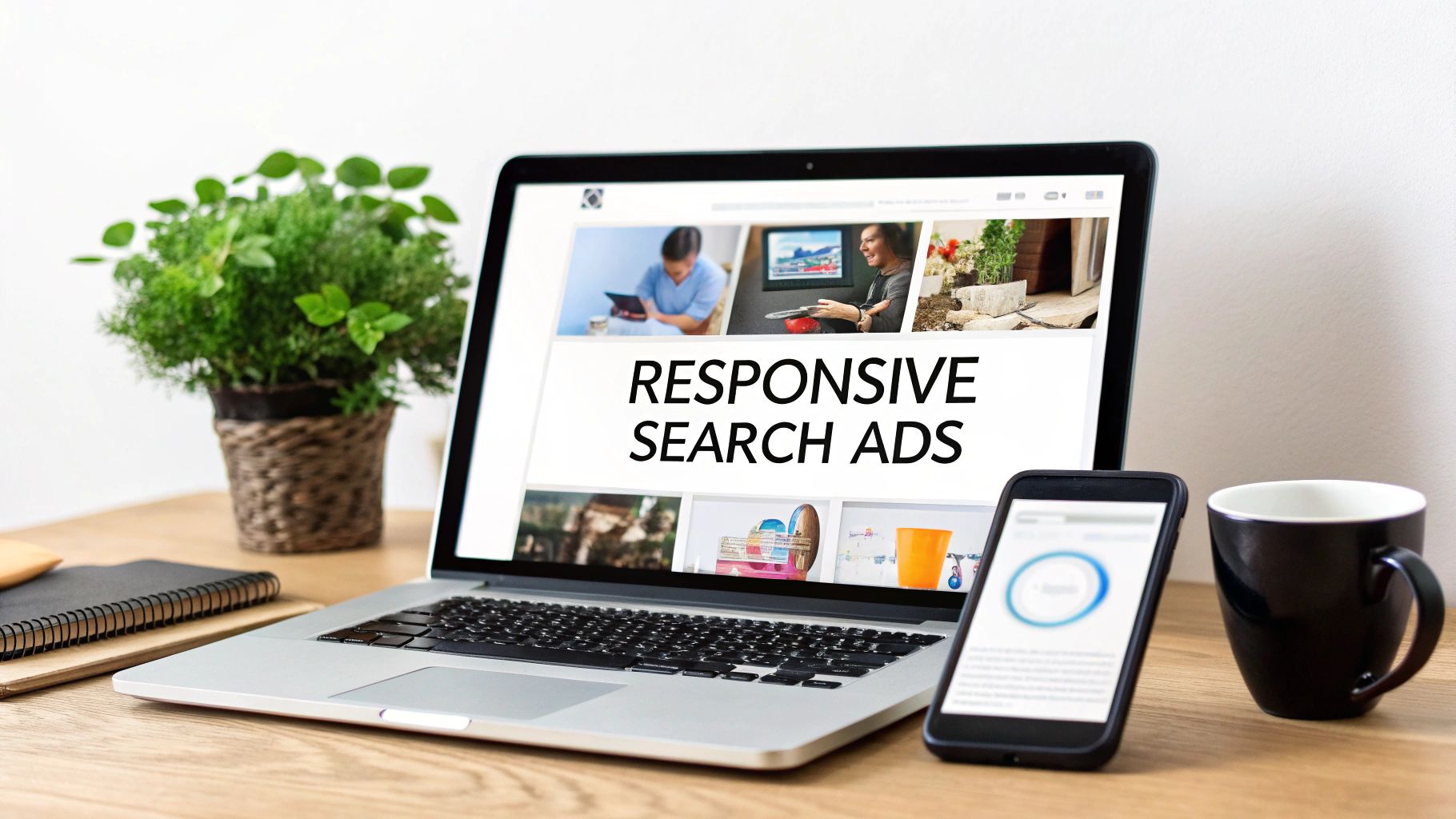
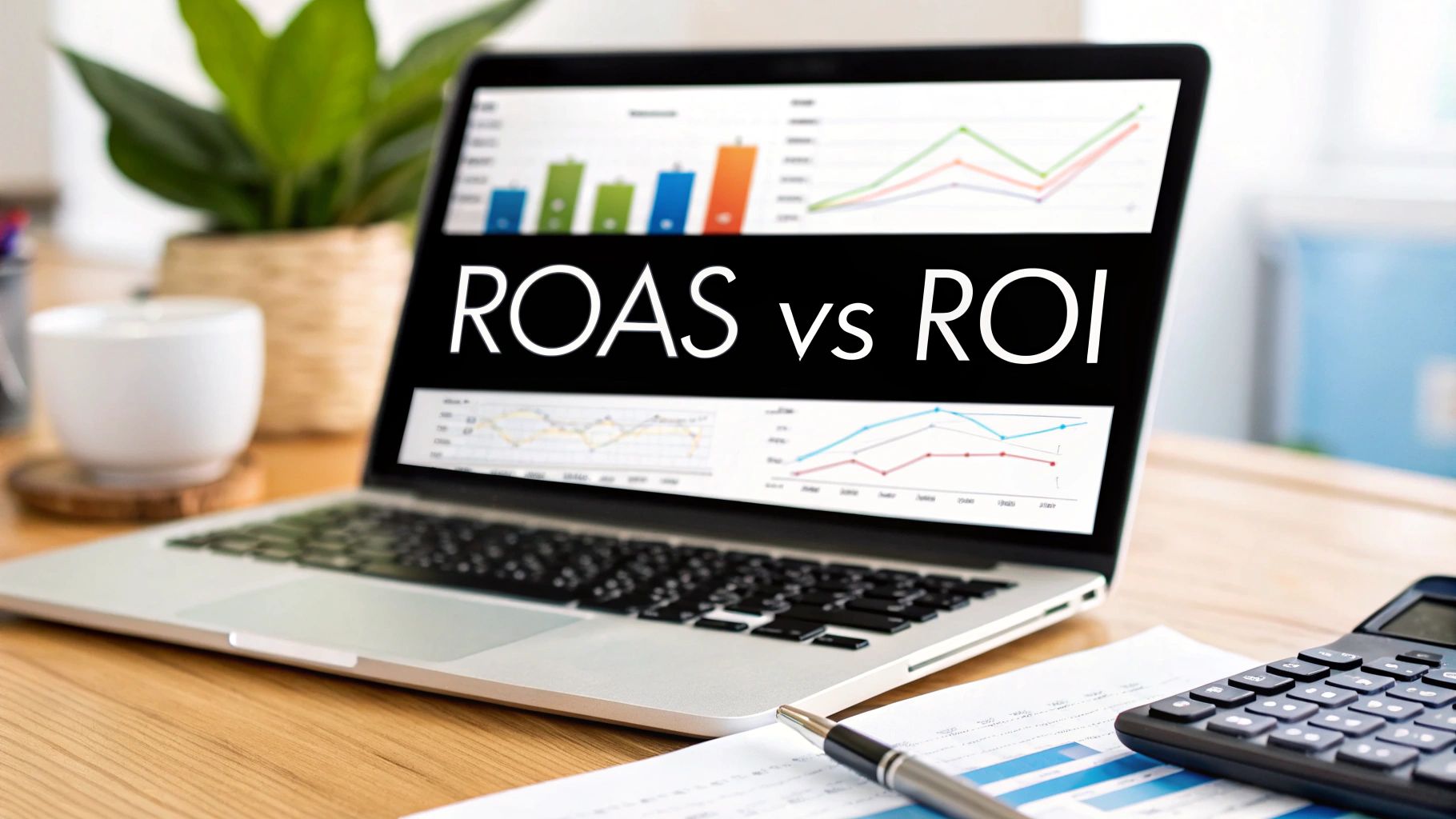
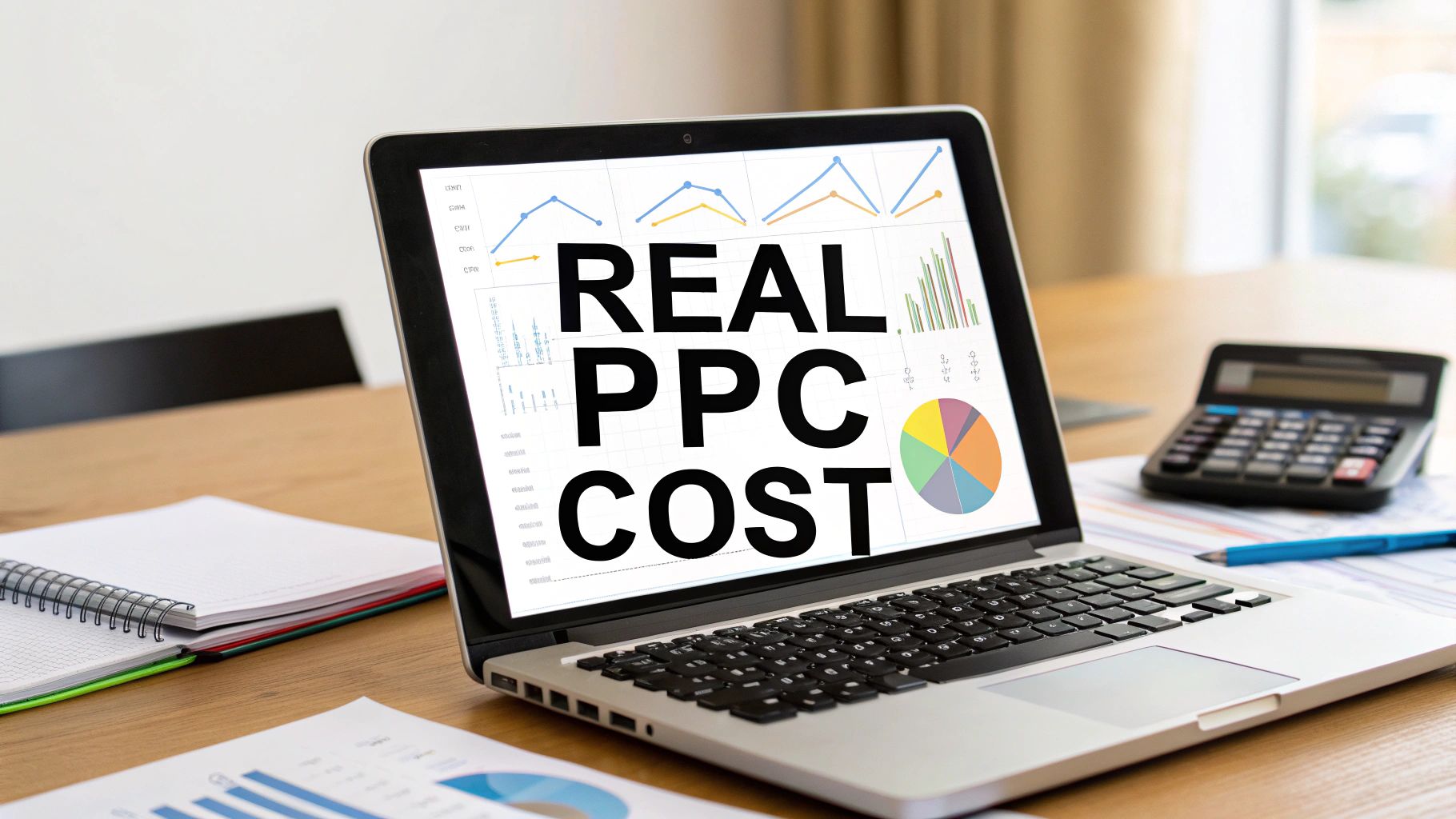
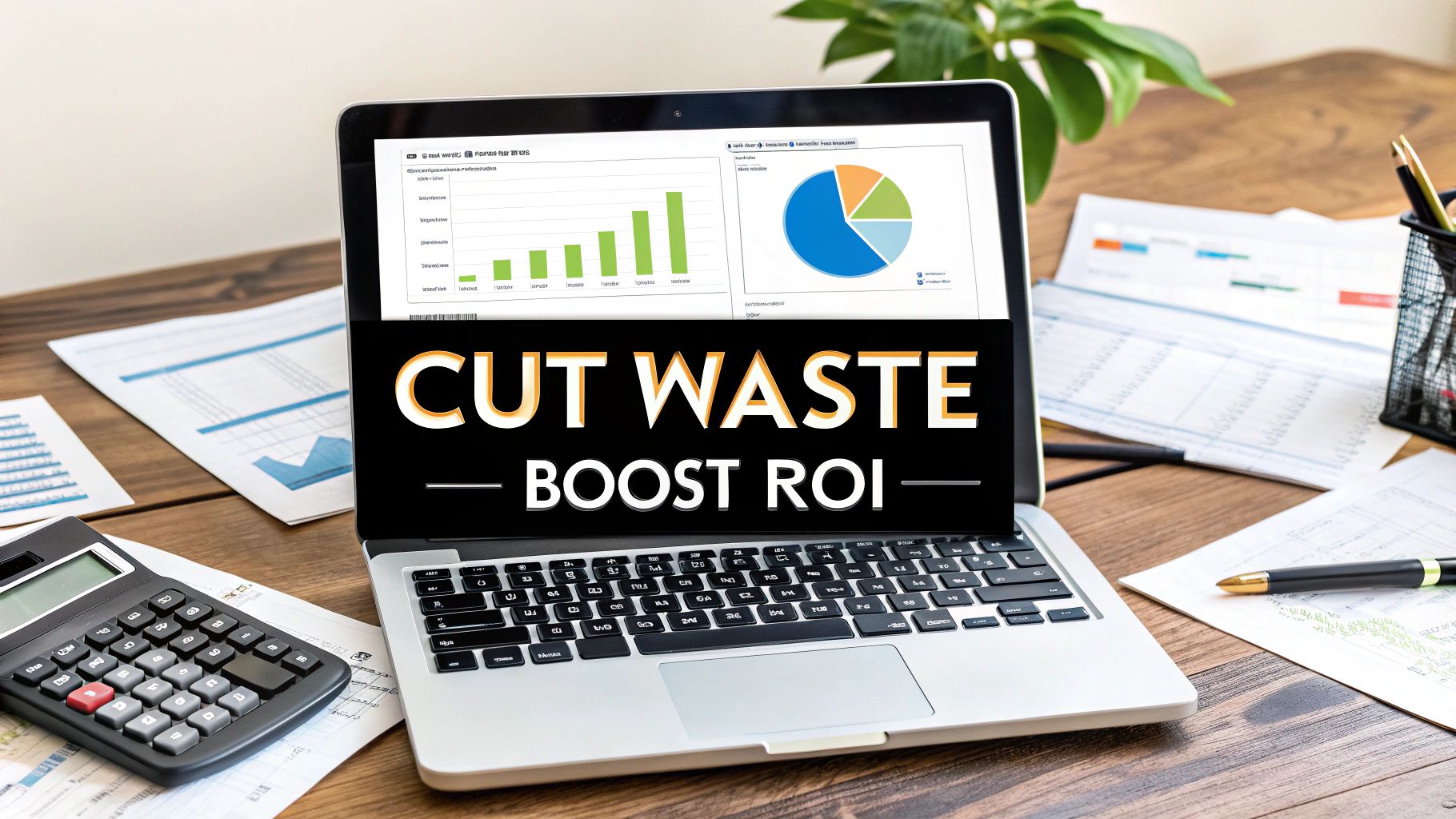
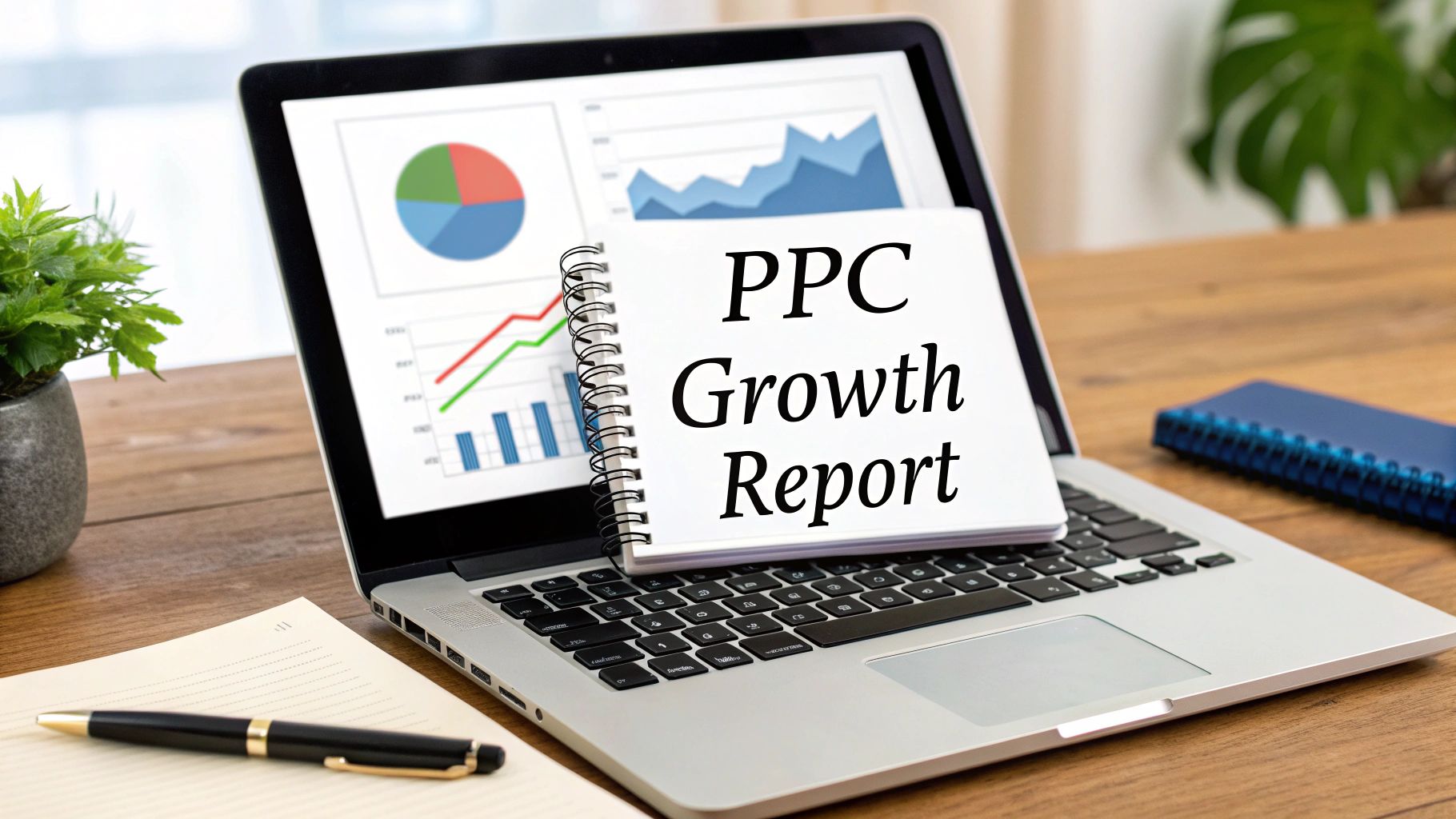
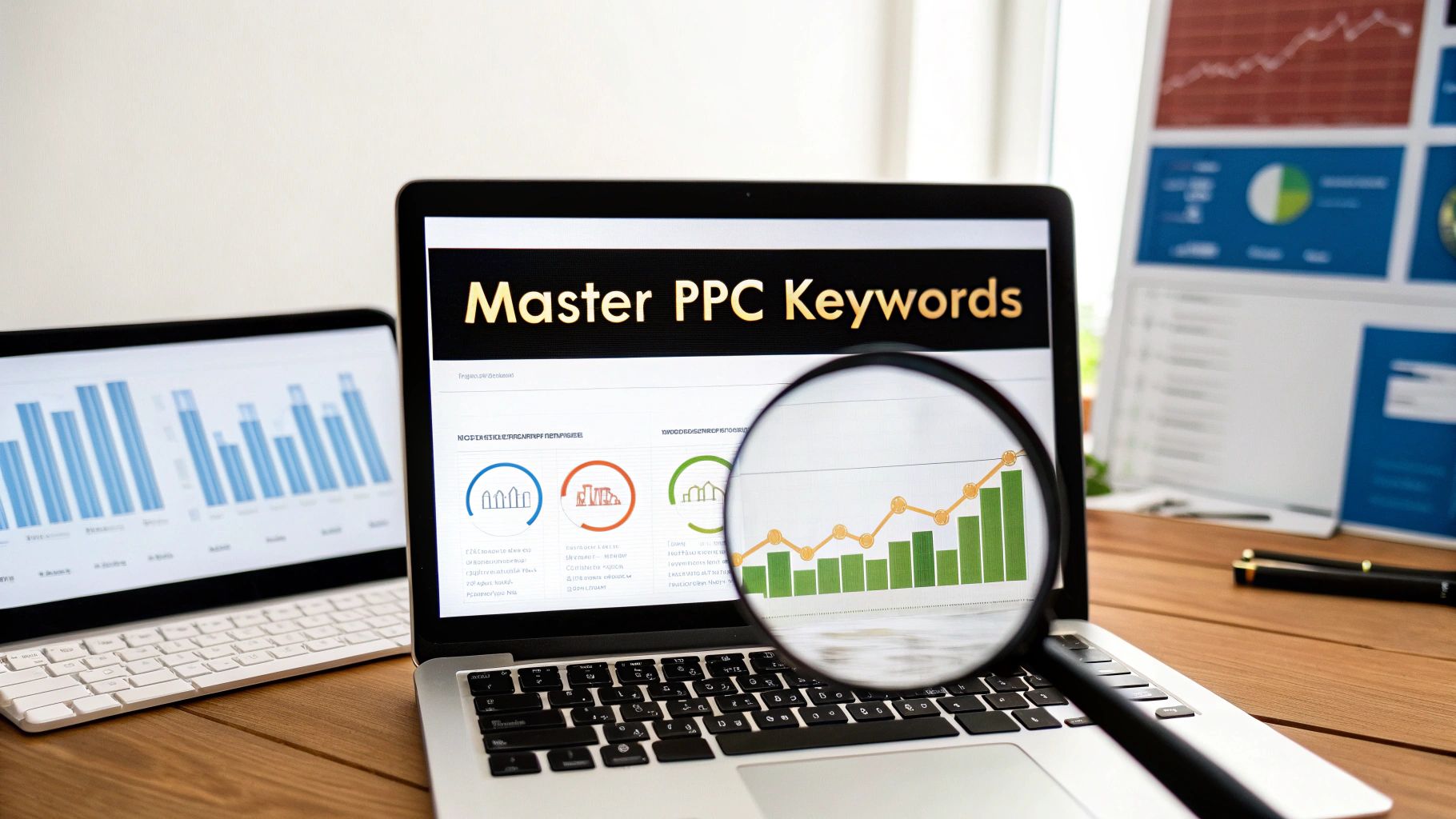
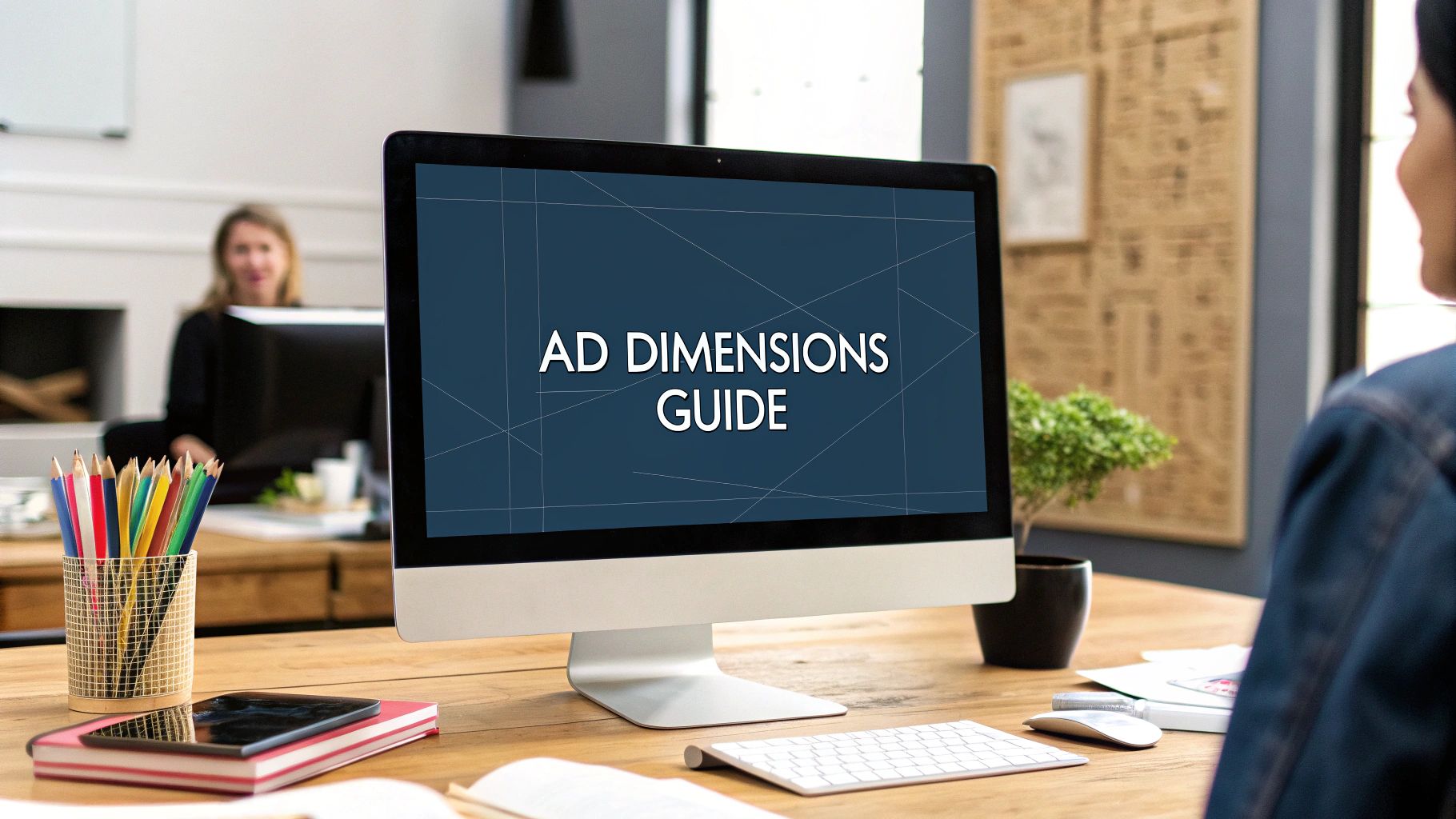
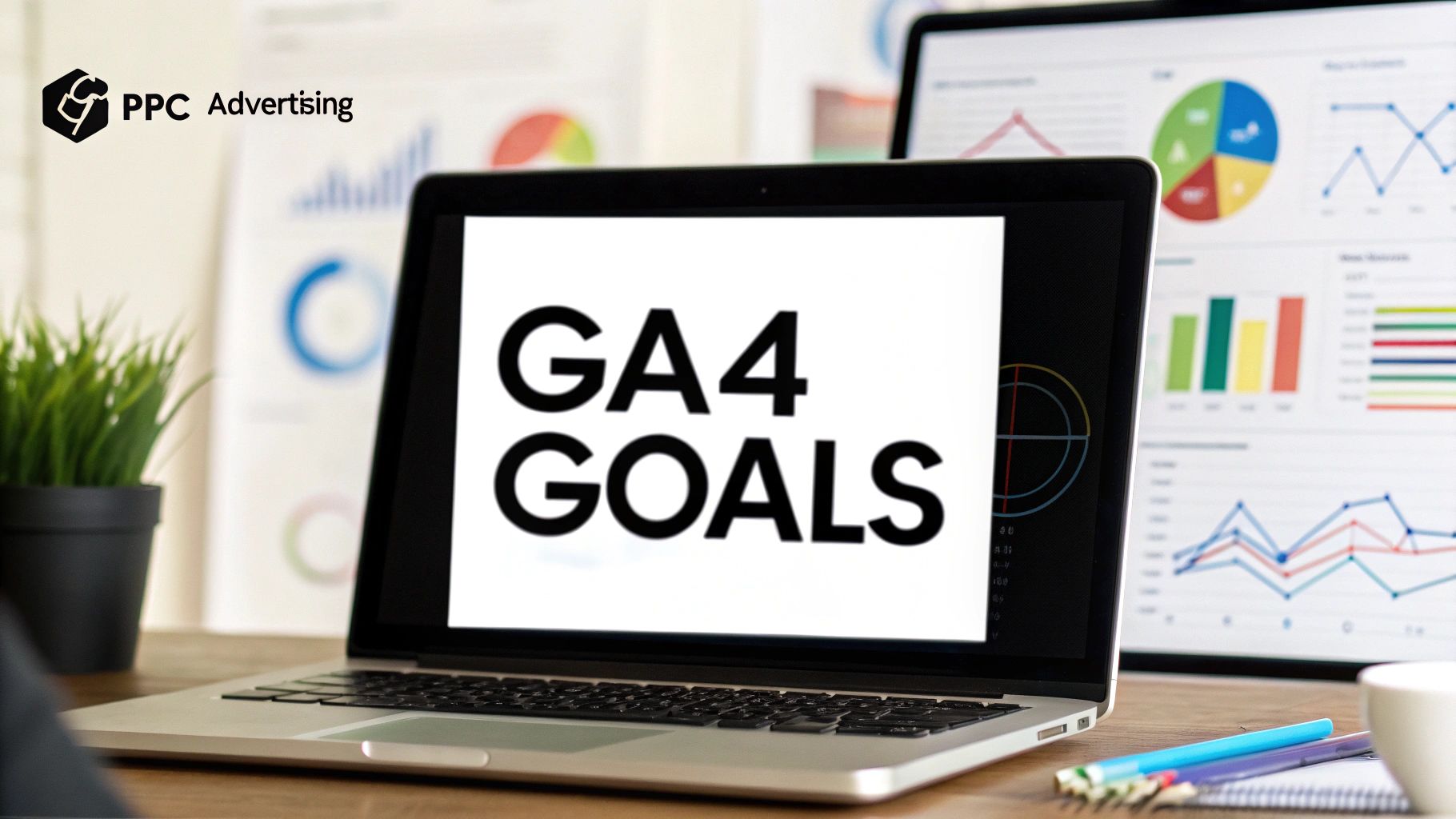
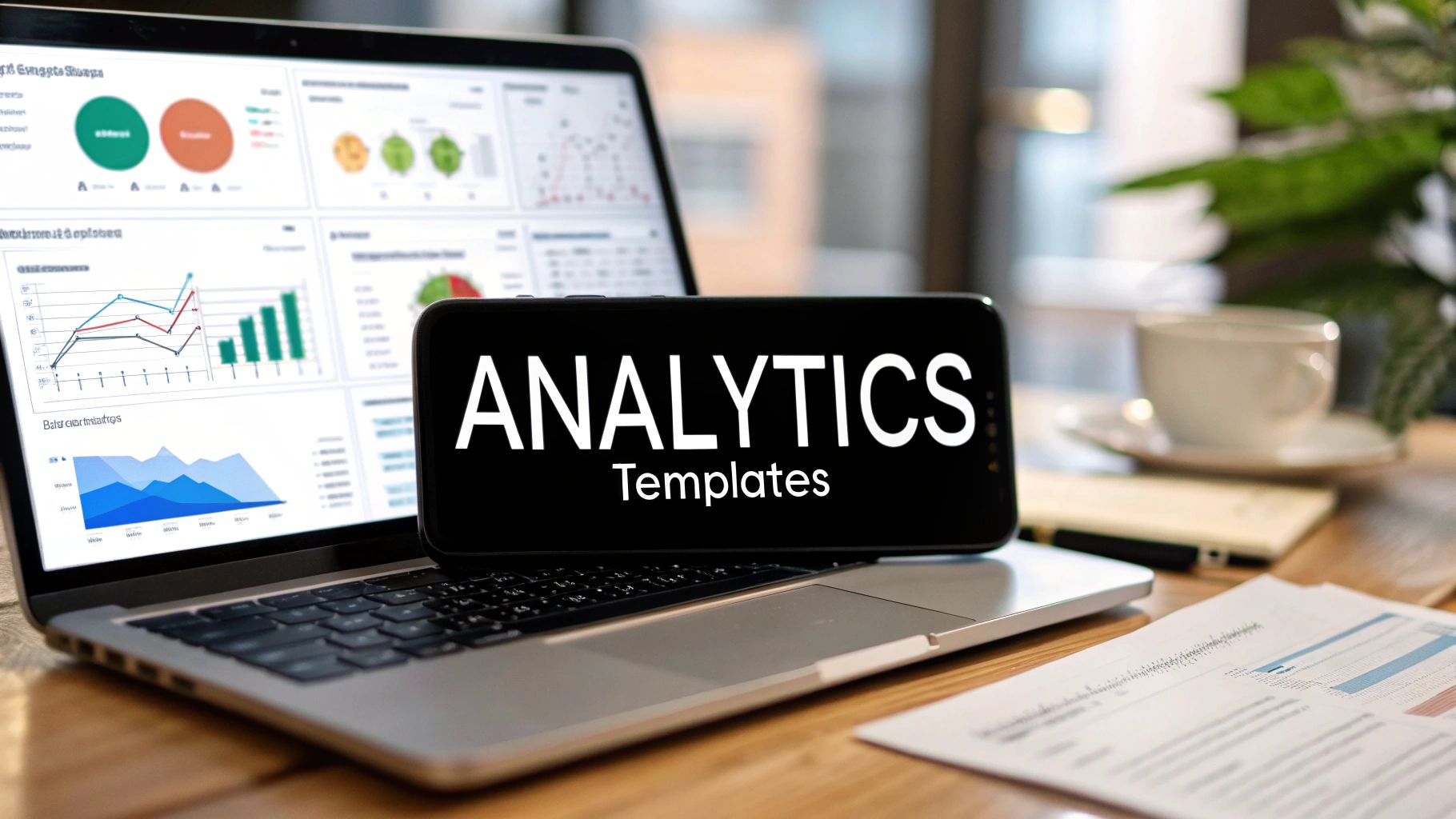
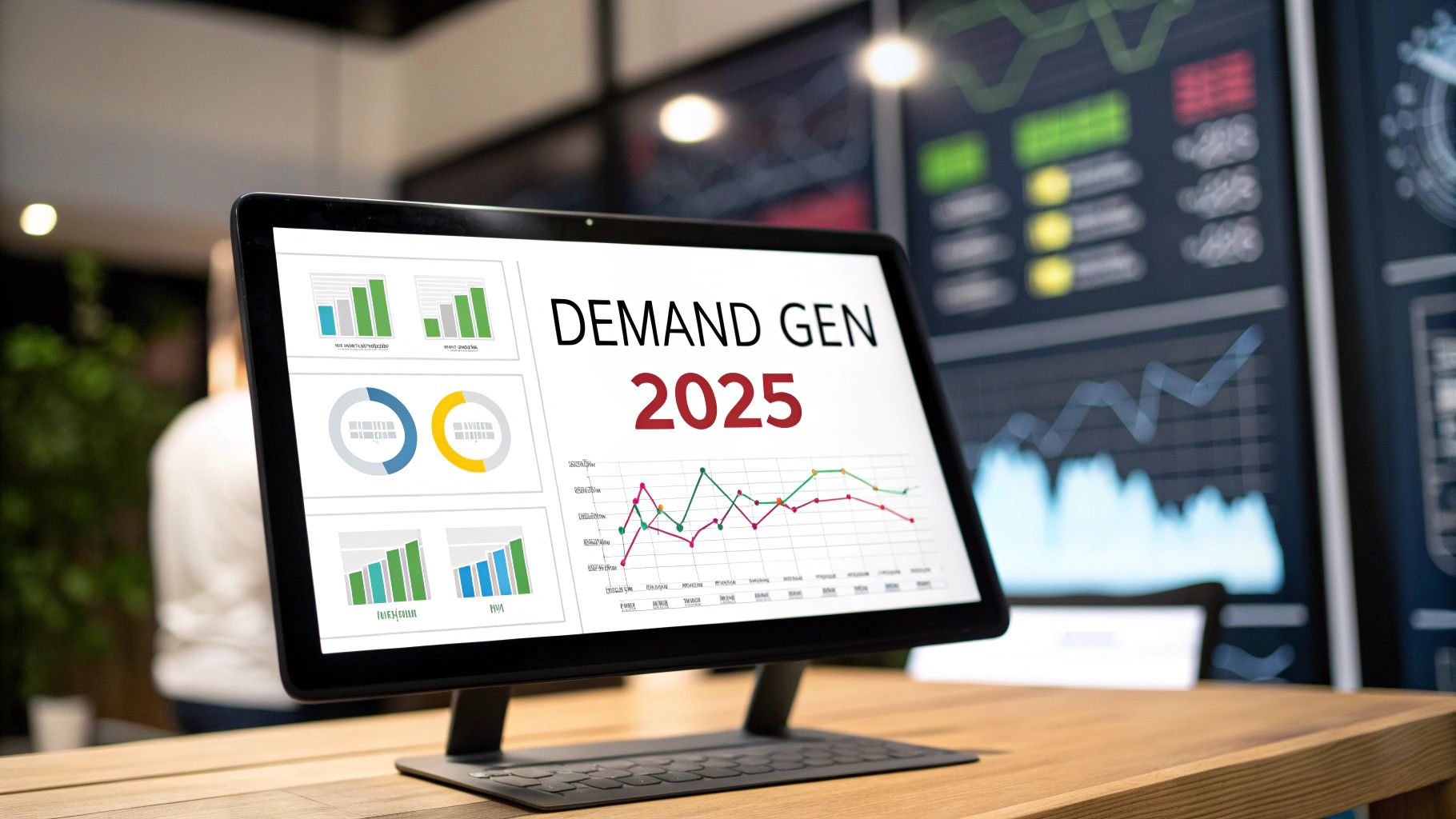
Comments